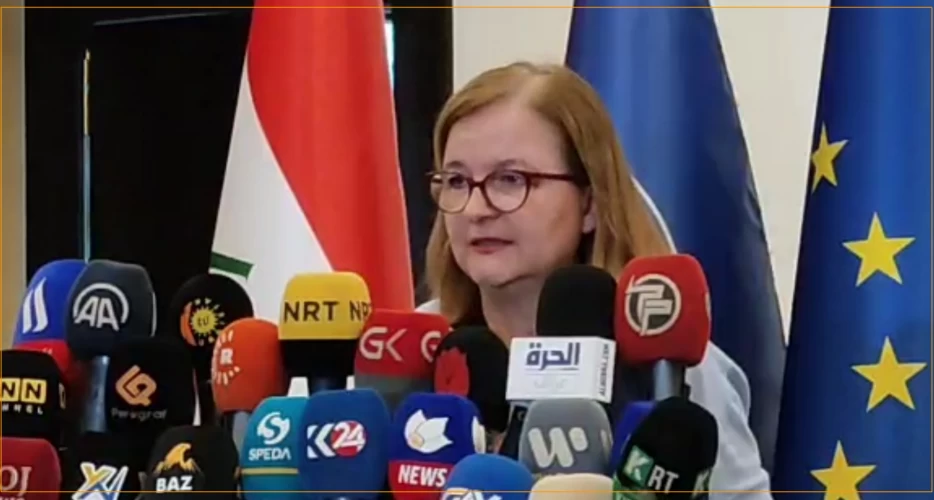
PEREGRAF
A delegation of members of the European Parliament on Thursday (May 26) wrapped up a tour focused on security and human rights by reasserting the European Union’s support for stability and development in Iraq and the Kurdistan Region.
Led by Nathalie Loiseau, who chairs the European Parliament’s Subcommittee on Security and Defense, the delegation met with a range of leaders during their four-day visit to Baghdad and Erbil, which included meetings with Iraqi President Barham Salih, Kurdistan Region President Nechirvan Barzani, and Kurdistan Parliament Speaker Rewaz Fayaq.
“We care about the situation in the Middle East and the stability and the security of Iraq and of Kurdistan especially. We have a long tradition in Europe of friendship with Kurdistan,” Loiseautold a press conference in Erbil.
She highlighted the support EU countries have provided to Iraq’s security forces and the Peshmerga during the fight against Islamic State (ISIS) and argued that the threat posed by the militant group remains relevant because the underlying causes of radicalization are under-addressed.
“Even when you defeat people militarily, it's hard to defeat an ideology. There has to be opportunities for people everywhere, in Iraq and in the Kurdish region. There has to be jobs. There has to be hope,” Loiseau told reporters.
Turning to government formation, the French MEP urged allparties to build on the momentum provided by the federalelections in October, which she noted had been monitored by an extensive EU observer mission.
“There is a need to have the president of the country, to have thegovernment of the country fully functioning, making use of the budget and making use of the resources which exist in this country. And there's a need to make sure that ordinary citizens can trust the authorities and that human rights are respected,” Loiseau said in response to a question asked by a Peregrafreporter.
Loiseau said that she hoped that ongoing talks between the parties in the Kurdistan Region would be “fruitful” and that regional elections, which are currently scheduled for October, would be held in “due time” when all political and legal issues are solved.
Over the past week, there have been several rounds of talksbetween the Region’s parties in an effort to resolve tensions, particularly those between the Kurdistan Democratic Party (KDP) and the Patriotic Union of Kurdistan (PUK), over the Region’s electoral law, the sharing of internal revenue, and the Iraqi presidency.
Loiseau also emphasized that the delegation had heard clearly during its meetings that security in the “disputed areas,” including Sinjar, is key to Iraq’s overall stability and that the country should be free from external interference and violence by militia groups.
“The only legitimate use of violence comes from the state to protect the citizens,” she said, adding that civilians should never be targeted.
Asked whether the authorities in the Kurdistan Region were ignoring criticisms about violations of freedom of expression and democratic norms, Loiseau said in general that “you cannot build a stable future if human rights are not respected,” adding that the MEPs had discussed the issue during their meetings this week.
During her opening remarks, Loiseau said that part of the delegation’s mission was to emphasize the “importance of the war in Ukraine” for leaders in Iraq and the Kurdistan Region, calling Russia’s invasion of its neighbor “unjustified.”
She particularly noted how Moscow’s actions are preventing food exports from Ukraine from getting to the Middle East, resulting in a spike in food prices.
“We count on your support to express your concern towards the Russian aggression,” Loiseau said.
Russian state-owned energy companies have significant investments in Iraq and the Kurdistan Region, with Rosneft owning 60 percent of the Kurdistan Region’s export pipeline.
In addition to Barzani and Fayaq, the delegation also met withDeputy Speaker of the Kurdistan Parliament Speaker Hemin Hawrami, Kurdistan Regional Government (KRG) Minister of Interior Reber Ahmed, KRG Minister of Peshmerga Affairs Shoresh Ismail, representatives of civil society, and staff of the local UNESCO office during their stay in the Kurdistan Region.